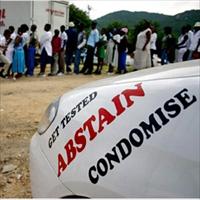SUDAN: The art of HIV education in the south

Taban heads The Heavens, a drama and musical group of 14
members whose performances rotate largely around church music and social
issues, including HIV/AIDS.
The Heavens use theatre and musical comedy to spread
awareness about HIV/AIDS, taking the message directly to local pubs and clubs.
"We are supporting a lot of drama, both live and on
radio," said Sister Cecilia Sierra Salcido, who manages Sudan Catholic
Radio, which supports the theatre productions. "It's the closest we can
get to the people."
"In a country where many people are illiterate,
cultural events are much more effective in advocating for social change than
any UN report or conference," said Caroline Arnulf, advisor to the local
government recovery programme at the United Nations Development Programme in
Juba. Southern Sudan has one of the world's lowest literacy
rates, with just 24 percent of the population able to read and write, according
to the UN Population Fund.
During the three years since Southern
Sudan emerged from a 21-year war with the north, talk has
dominated the AIDS awareness messages. "Most people think that the only
way to make people aware is through workshops," Taban said.
More recently, however, theatre and music have become
more popular as ways to entertain and pass on the HIV message. The Heavens
produced the theme song for World AIDS Day 2006, organised by the UN Children's
Fund and the South Sudan AIDS Commission, and during celebrations to mark
International Women's Day in March, they staged two hours of theatre on the
issues of HIV/AIDS and bride-price.
"Art can do a lot for development and I believe it
should be used more often, especially with the youth who are very responsive to
that kind of events," Arnulf said.
Southern Sudan's HIV/AIDS programmes have gotten off to a slow start, mainly
due to poor funding, but a roadmap
for HIV prevention, treatment and care was announced in 2007.
Although the official national HIV prevalence of Sudan stands at
2.6 percent, many areas of the south are thought to have significantly higher
levels.
 Back and Next - Back and Next
Back and Next - Back and Next See Also - See Also
See Also - See Also